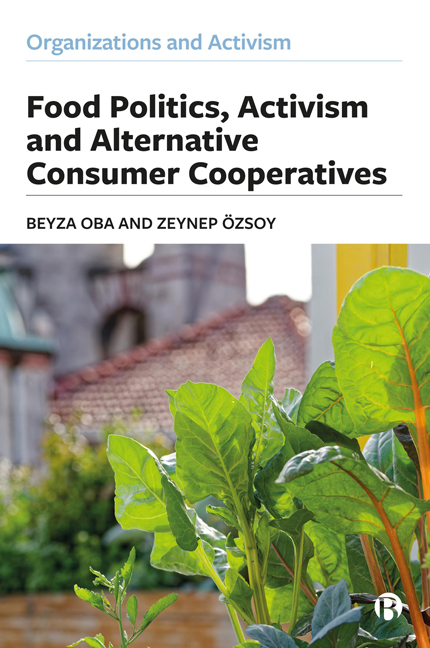Book contents
- Frontmatter
- Contents
- Series Editors’ Preface
- 1 Introduction: Experimenting with Direct Democracy
- 2 The Politics of Food: Alignment for Solidarity and Resistance
- 3 Against Neo-Liberalism and Authoritarianism: The Background to Food Politics in Turkey
- 4 The Political Economy of Consumer Cooperatives in Turkey
- 5 Alternative Consumer Cooperatives in the Making of a Public Sphere
- 6 Experimenting with an Alternative to the Capitalist Food Provisioning System
- 7 The Governance of Alternative Consumer Cooperatives
- 8 Instead of a Conclusion
- Notes
- References
- Index
5 - Alternative Consumer Cooperatives in the Making of a Public Sphere
Published online by Cambridge University Press: 27 March 2024
- Frontmatter
- Contents
- Series Editors’ Preface
- 1 Introduction: Experimenting with Direct Democracy
- 2 The Politics of Food: Alignment for Solidarity and Resistance
- 3 Against Neo-Liberalism and Authoritarianism: The Background to Food Politics in Turkey
- 4 The Political Economy of Consumer Cooperatives in Turkey
- 5 Alternative Consumer Cooperatives in the Making of a Public Sphere
- 6 Experimenting with an Alternative to the Capitalist Food Provisioning System
- 7 The Governance of Alternative Consumer Cooperatives
- 8 Instead of a Conclusion
- Notes
- References
- Index
Summary
Introduction
In recent years, following the 2013 Gezi protests, citizens across Turkey have expressed their discontent with the prevailing neo-liberal system and political regime by establishing various forms of solidarity initiatives – consumer cooperatives, producer cooperatives and neighbourhood solidarity initiatives. These initiatives, while adhering to the spirit of Gezi, were driven by a claim to take an active role in issues concerning all the citizens in a specific locality. Gezi protesters, while responding to ‘the institutionalization of neo-liberalism and centralization of powers’ (Akçay, 2021, p 93), also developed a hope that through direct democracy, resistance and solidarity, citizens could have a voice in politics (Öztan, 2013; Parlak, 2013; Sevinç, 2022). In the local initiatives that proliferated after Gezi, through forums and neighbourhood assemblies (Mahalle Meclisleri), public opinion on issues such as food, child abuse, violence against women, betterment of labour conditions and collective action for resolving persistent problems was developed (Doğançayır, 2022; Kahraman, 2022). Mahalle Meclisleri (Olcan, 2020), were later named as district solidarity initiatives and, as noted by Fırat (2022), proliferated during the COVID-19 pandemic. After the announcement of the Coronavirus Support Programme by the government, 17 new solidarity initiatives were established in İstanbul, Ankara, Bursa, Ayvalık and Mersin. In this chapter we focus on one of these initiatives, the alternative consumer cooperatives (ACCs) and elaborate on their work in reclaiming the public sphere with a transformative potential that is shaped through the politicization of consumers and petty commodity producers. In so doing, we investigate how a public sphere concerning food politics in Turkey has been developed, who the main actors are, what types of media they use, and which other constituencies have been drawn in.
Borrowing on the Habermasian (1981, 1987, 1989) concept of the public sphere we see the ACCs as a space for the development and articulation of a special discourse. We consider the public sphere as a formation where groups of activists come together and question normative arrangements. We focus on the discourse, that is, how activists reflexively negate and question prevailing habits, practices and assumptions, and how the ACCs try to re-moralize everyday activities (for example as consumers, as volunteers), re-politicize the politics of food and build awareness for an ‘alternative’.
- Type
- Chapter
- Information
- Publisher: Bristol University PressPrint publication year: 2023

